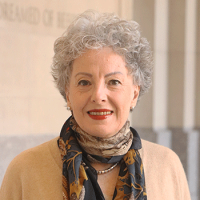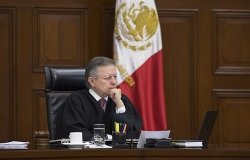Countdown to 2012: Mexico's Electoral Landscape in the Year Ahead
A diverse team of experts discussed Mexico’s political landscape as the country prepares for presidential elections in 2012. They examined prospects for the major candidates and parties, how the economy, security and foreign relations are likely to be debated, and the health of Mexico’s electoral system.
Overview
U.S.-Mexico relations solid ahead of ’12 vote
WASHINGTON—Bilateral relations should continue on solid footing regardless of the winner of Mexico’s 2012 presidential vote; and “no surprises” emerged from this month’s closely watched governor’s races, speakers said at the conference, Countdown to 2012: Mexico’s Electoral Landscape in the Year Ahead. “There should be continuity (in U.S.-Mexico relations) no matter who is elected in Mexico,” said Andrew Selee, Director, Woodrow Wilson Center Mexico Institute.
“There should be continuity (in U.S.-Mexico relations) no matter who is elected in Mexico,” said Andrew Selee, Director, Woodrow Wilson Center Mexico Institute.
At the July 8 conference, organized by the Woodrow Wilson Center Mexico Institute, a panel of experts discussed Mexico’s political landscape as the country prepares for national elections next year. Speakers discussed how the economy, crime and violence, foreign relations, and the electoral system will be debated.
José Antonio Crespo, a regular columnist and well-known scholar at the Center for Economic Research and Teaching, led off the panel with a review of the July 3 gubernatorial races in the states of Mexico, Coahuila, and Nayarit, which he said resulted in “no surprises” as the Institutional Revolutionary Party (PRI) won in all three states as expected. Crespo added that the PRI’s State of Mexico win helps consolidate outgoing Governor Enrique Peña Nieto’s status as the frontrunner for his party’s presidential nomination and as the current favorite in polls for the 2012 election. The outcome of the July 3 state elections also had significant implications for the two losing parties, exposing fissures within the center-left Party of the Democratic Revolution and, for the center-right National Action Party, showing the risks of close identification with incumbent President Felipe Calderon Hinojosa.
Duncan Wood, Acting Chair of the International Relations Department at the Instituto Tecnológico Autónomo de México, said that despite Mexico’s sound macroeconomic status and prospects for continued economic expansion, voter perceptions continue to lag behind and they will not likely reward the incumbent party for the past year’s stable inflation rate and modest growth. “Public opinion is quite pessimistic on the economy; the average Mexican is not convinced by the positive macroeconomic outlook,” Wood said. Also, the country’s many poor are not likely to endorse the status quo, given continuing underemployment, rising food inflation, and other concerns.
Roberta Lajous, a visiting professor at El Colegio de México and former Ambassador to Austria, Cuba, and Bolivia, discussed Mexico’s role in the international community and whether it may or may not be a subject of debate during the presidential campaigns. In general, she concluded, there are not strong differences between the parties when it comes to international relations, and she noted that Mexican migration abroad, an issue that had been the subject of debate in the past, has recently decreased in salience, given the drop-off in unauthorized border-crossings from Mexico. She added that the debate on the rights of Mexicans to vote when living abroad has also subsided as it has become evident that the rules for absentee voting would not change in this election cycle and as the estimates of potential voters has been significantly reduced. On issues of security and migration, she voiced her belief in an emerging consensus that these issues need to be dealt with in the context of sustained international cooperation. “The problem is no longer a bilateral one but rather a multilateral one,” she said.
Luis Carlos Ugalde, former President, Federal Electoral Institute, noted a number of factors that continue to weigh down Mexico’s electoral system. One such factor is the refusal of many candidates to fully and promptly accept the results of elections, whatever the outcome. Instead, there are a growing number of cases in which the defeated candidate refuses to concede and instead calls into question the legitimacy of the election process. Ugalde pointed to the July 3 governor’s election in the State of Mexico as a case in point when the second-place finisher refused to acknowledge his defeat despite a 40-point difference between himself and the winner. Ugalde also noted a lack of accountability at the state level where public funds can be used to finance campaigns, damaging democracy and making campaigns more costly. Finally, he argued that expatriate voting will not significantly increase in the upcoming election since Mexican migrants historically have shown little interest in participating in Mexican elections.
U.S.-Mexico relations should remain on solid footing after the election, and no “cataclysmic change” will take place in security cooperation and economic integration, two deeply interconnected items in the relationship, Andrew Selee, Director, Woodrow Wilson Center Mexico Institute, said. “Mexico has a public security crisis that requires U.S. engagement, and there is a growing understanding in the United States that we are jointly responsible for it,” he said.
Also announced during the panel was the launch of the Mexico Institute’s on-line resource guide for the 2012 presidential election. The guide will include background information and analysis on the candidates, political parties, main policy issues, and the timeline for the election.
The elections guide can be found here: http://mexicoinstituteonelections.wordpress.com/.
For more information, click here for the event webpage or contact Miguel Salazar, Woodrow Wilson Center Mexico Institute program assistant at miguel.salazar@wilsoncenter.org.
Speakers
José Antonio Crespo
Centro de Investigación y Docenia Económicas (CIDE)

Duncan Wood

Roberta Lajous
Researcher, El Colegio de Mexico; former Mexican Ambassador to Austria, Bolivia, Cuba, and Spain
Luis Carlos Ugalde

Andrew Selee
President, Migration Policy Institute
Hosted By

Mexico Institute
The Mexico Institute seeks to improve understanding, communication, and cooperation between Mexico and the United States by promoting original research, encouraging public discussion, and proposing policy options for enhancing the bilateral relationship. A binational Advisory Board, chaired by Luis Téllez and Earl Anthony Wayne, oversees the work of the Mexico Institute. Read more
Thank you for your interest in this event. Please send any feedback or questions to our Events staff.









